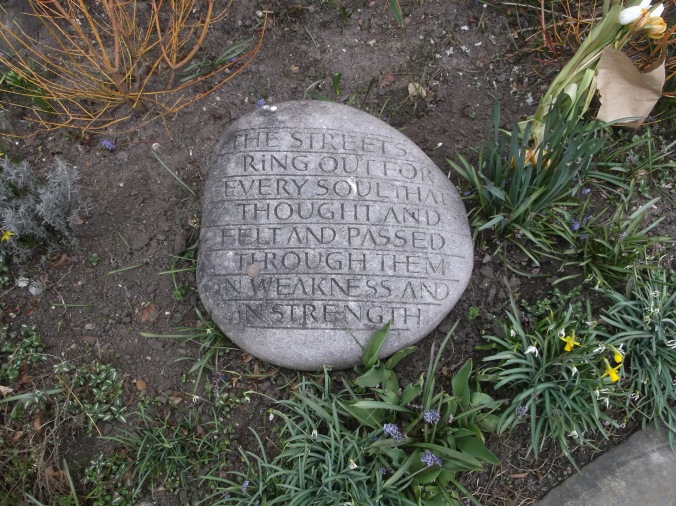In setting my Grand Christmas Quiz, I see I may have implied that Lord Harris had a memorial garden dedicated to him in the precincts of Canterbury Cathedral. A return visit yesterday reveals that my memory was imperfect (I may have been confusing the genuine Cathedral with the “Cathedral of Cricket“, where I believe he does have a kind of champagne-garden named after him). What is in Canterbury is a cloistered garden of remembrance for the “men and women of Kent who fell in the Great War“, which “by his help was made”.
The garden itself struck me as an austere (indeed monastic) space, though that may have been the effect of visiting in late afternoon on a cold day in March.
It also features a number of enigmatic stone inscriptions that might have strayed in from Little Sparta, such as this:
and this:
I doubt that these additions would have met with the approval of His Lordship. I also, sadly, doubt whether it is true that he is “held in grateful memory by all lovers of cricket and field games”. Even those who don’t confuse him with Lord Hawke (the Archbishop of York to his Canterbury) are more likely to remember him as reactionary, imperialist and autocratic, a high Victorian who lived on into the Jazz Age, and accused Percy Fender and Lionel Tennyson, for instance, of “Bolshevism” for refusing to lead their teams out at Lord’s from a separate entrance to the professionals (a practice which, contrary to popular belief, was not common elsewhere).
I also, personally, doubt whether any man could have been quite as one-dimensional as Harris is conventionally portrayed. In fact, anyone who genuinely fancies themselves as an “alternative” cricket-writer could do worse than attempt a rehabilitation of his reputation.
(On the subject of memorials in Canterbury, I rather liked this homelier example, a horse-trough turned flower bed in the high street:
The allusion here is to Job 39:21 “He paweth in the valley, and rejoiceth in his strength: he goeth on to meet the armed men.“)




